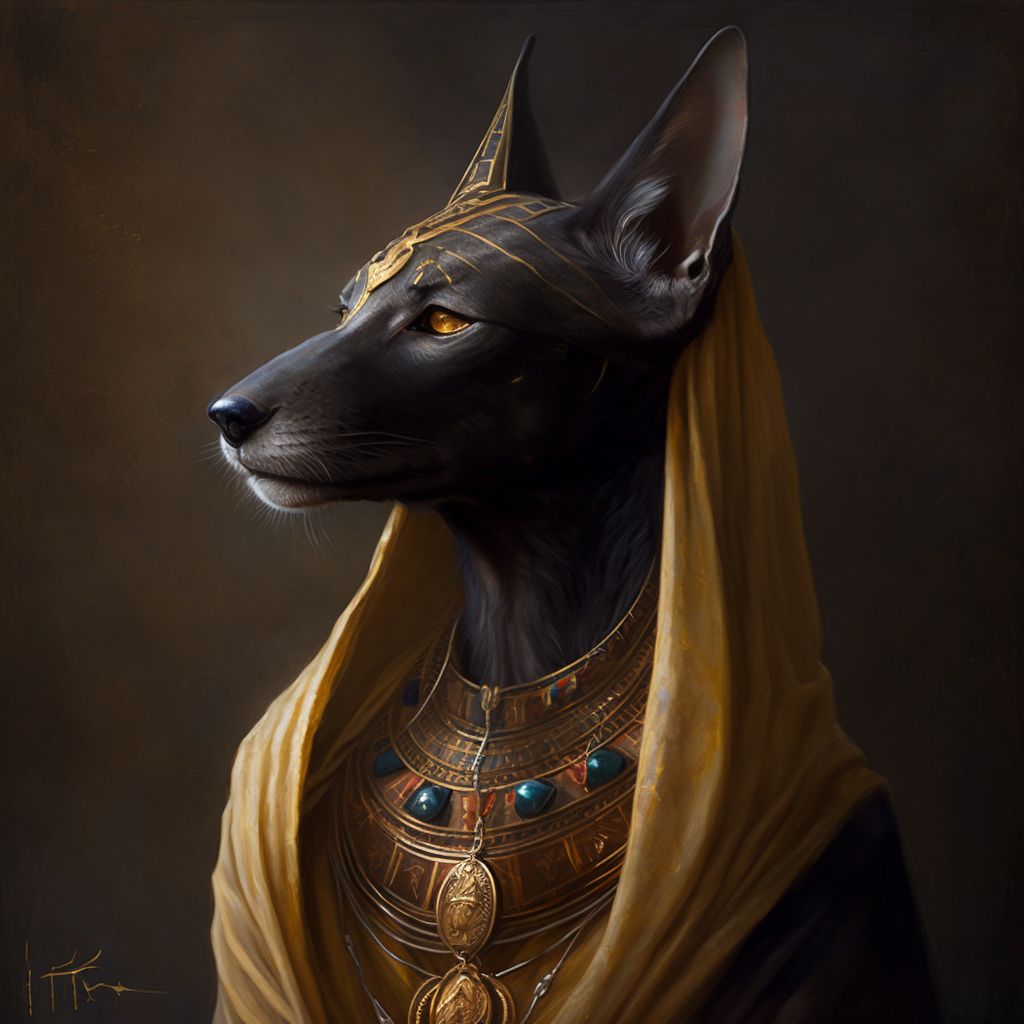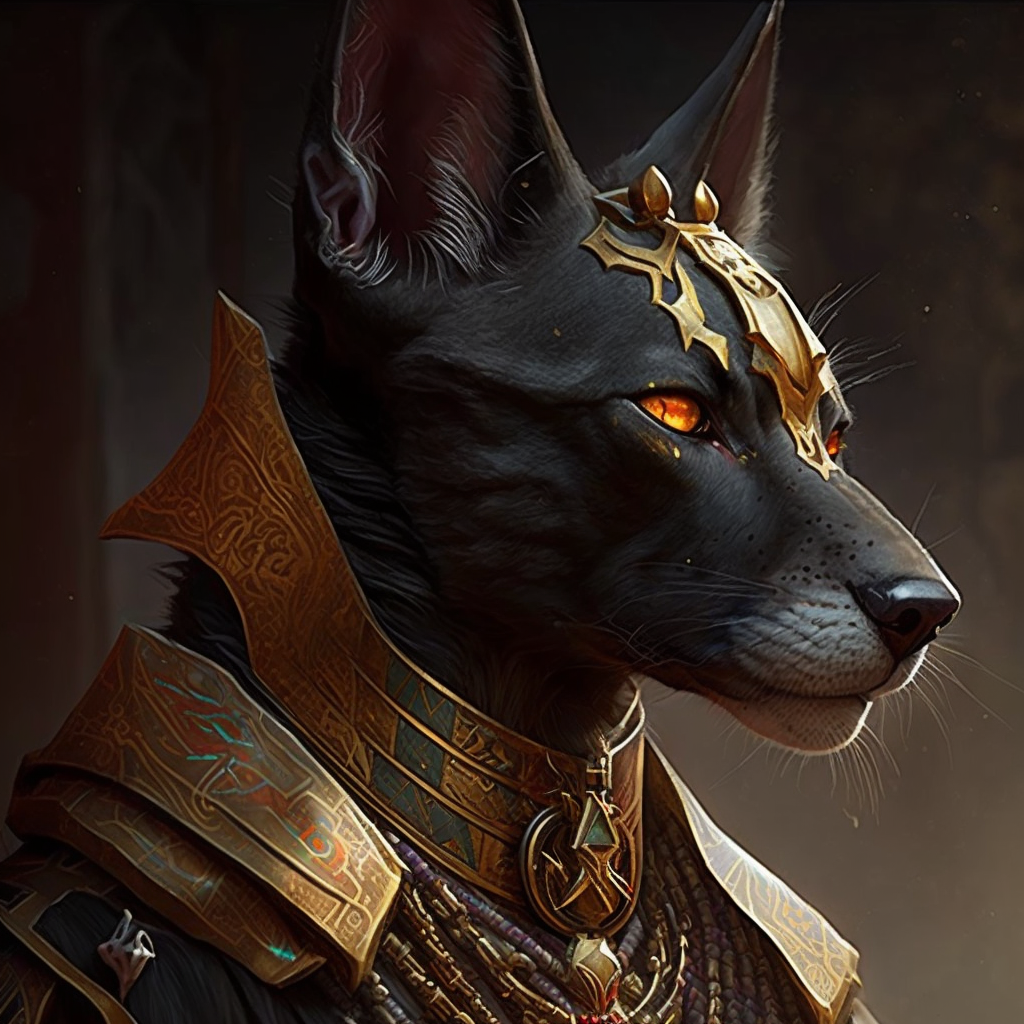Khentiamentiu, First of the Westerners (Dead), Lord of the Amenti, and He Who is in the Place of Embalming
Khentiamentiu is an ancient Egyptian god associated with funerary rites and the afterlife.

- Pantheon: Egyptian mythology
- Deity Title: Khentiamentiu, also known as the First of the Westerners, Lord of the Amenti, and He Who is in the Place of Embalming
- Deity Symbol: A seated or standing jackal wearing a collar and sun disk
- Home Plane: Amenti, the underworld in Egyptian mythology
- Deity Level: Demigod or lesser deity
- Alignment: Lawful neutral
- Aliases: Anubis, Osiris, Wepwawet, Yinepu
- Superior: Osiris
- Traditional Allies: Osiris, Anubis, Thoth, Hathor
- Traditional Foes: Apophis, Set, Apep
- Divine Artifact: None known
- Servants: None known
- Servitor Creatures: None known
- Sacred Animal: Jackal
- Manifestations: Appearances as a jackal or jackal-headed man, presiding over funerary rituals, judging souls of the deceased
- Signs of Favor: Positive outcome in funerary rituals, protection from evil spirits and underworld dangers
- Worshipers: Priests, embalmers, mourners
- Cleric Alignments: Lawful neutral, lawful good, neutral
- Specialty Priests: Funerary priests, embalmers, mourners
- Holy Days: No specific holy days, but ceremonies were held during funerary rituals
- Portfolio: Funerary rites, embalming, judging the souls of the dead, protection of the dead
- Domains: Death, protection, law
- Favored Weapon: Khopesh
- Favored Class: Cleric
- Favored Race: Jackalwere
- Duties of the Priesthood: Conducting funerary rituals, embalming, judging souls of the deceased, protection of the dead
- Major Cult/Temple Sites: Abydos, Memphis
- Benefits: Protection from evil spirits and underworld dangers, guidance in the afterlife, blessings for the dead, aid in funerary rituals.
Khentiamentiu is an ancient and enigmatic deity of the Egyptian pantheon, revered for his role as the “Foremost of the Westerners” and protector of the dead. He is often depicted as a jackal-headed figure, with a sleek black coat and piercing golden eyes that seem to see straight into one’s soul.
Standing tall and regal, Khentiamentiu exudes an aura of calm authority, his powerful presence inspiring both reverence and fear in equal measure. His muscular form is lean and sinewy, his lithe movements betraying a fluid grace that suggests he is equally at home on land or in the spirit realm.
From his sharp ears to his gleaming fangs, every aspect of Khentiamentiu’s appearance is imbued with symbolism and meaning. His jackal’s head represents his role as a psychopomp, guiding the souls of the departed to the afterlife. Meanwhile, his black fur speaks to his association with the fertile earth, while his gold eyes symbolize the sun, an eternal reminder of the cyclical nature of existence.
As a deity, Khentiamentiu is both feared and revered, for he holds the power of life and death in his paws. His primary role is to oversee the process of judgment in the afterlife, weighing the hearts of the deceased against the feather of Ma’at to determine their fate. However, he is also a guardian and protector of the dead, ensuring that they are guided safely through the perils of the underworld and granted eternal rest.
While his motives may seem inscrutable to mere mortals, Khentiamentiu’s ultimate goal is to maintain the delicate balance of the universe, ensuring that all things continue to function according to their proper place and purpose. His actions may seem harsh or cruel at times, but they are always guided by a deep sense of justice and a commitment to upholding the natural order of things.
Currently in the World

Khentiamentiu, the powerful god of the dead, has watched over the afterlife since the dawn of time. His role has always been to judge the souls of the deceased, and he takes this task seriously. He is often depicted as a mummified man with a jackal head, a symbol of his fierce and unrelenting nature. His eyes are said to be like blazing stars, always watching and waiting for the next soul to pass into the underworld.
In the 1450s, Khentiamentiu is as busy as ever, his realm filling with souls at an ever-increasing pace. His goals are simple but essential – to ensure that the souls under his care are judged fairly and sent to their rightful place in the afterlife. He is aided in this task by his trusted servants, the Anubis priests, who help him to weigh the hearts of the dead and determine their fate.
Despite his fearsome reputation, Khentiamentiu is not without his weaknesses. He is often prone to fits of anger, and his judgment can sometimes be clouded by his emotions. But he strives to keep these tendencies in check, knowing that a fair and impartial judge is what his subjects need.
In the world of the living, Khentiamentiu is a respected and revered figure, but he is not often called upon directly. Instead, his worshipers tend to seek out the guidance of his priests, who act as intermediaries between the living and the dead. Still, Khentiamentiu watches over the world, always vigilant and ready to act if his realm is threatened.
Khentiamentiu’s unique traits and strengths make him a formidable figure, but his weaknesses remind us that even the gods have their flaws. He is fiercely loyal to his subjects, and he will go to great lengths to ensure that they are treated justly. But he is not infallible, and his judgments are not always perfect.
Overall, Khentiamentiu is a powerful and respected deity, with a vital role to play in the world of the dead. His actions and interactions with the world are guided by his desire to keep his realm safe and just, and he will stop at nothing to achieve these goals.

 Buy me a coffee
Buy me a coffee